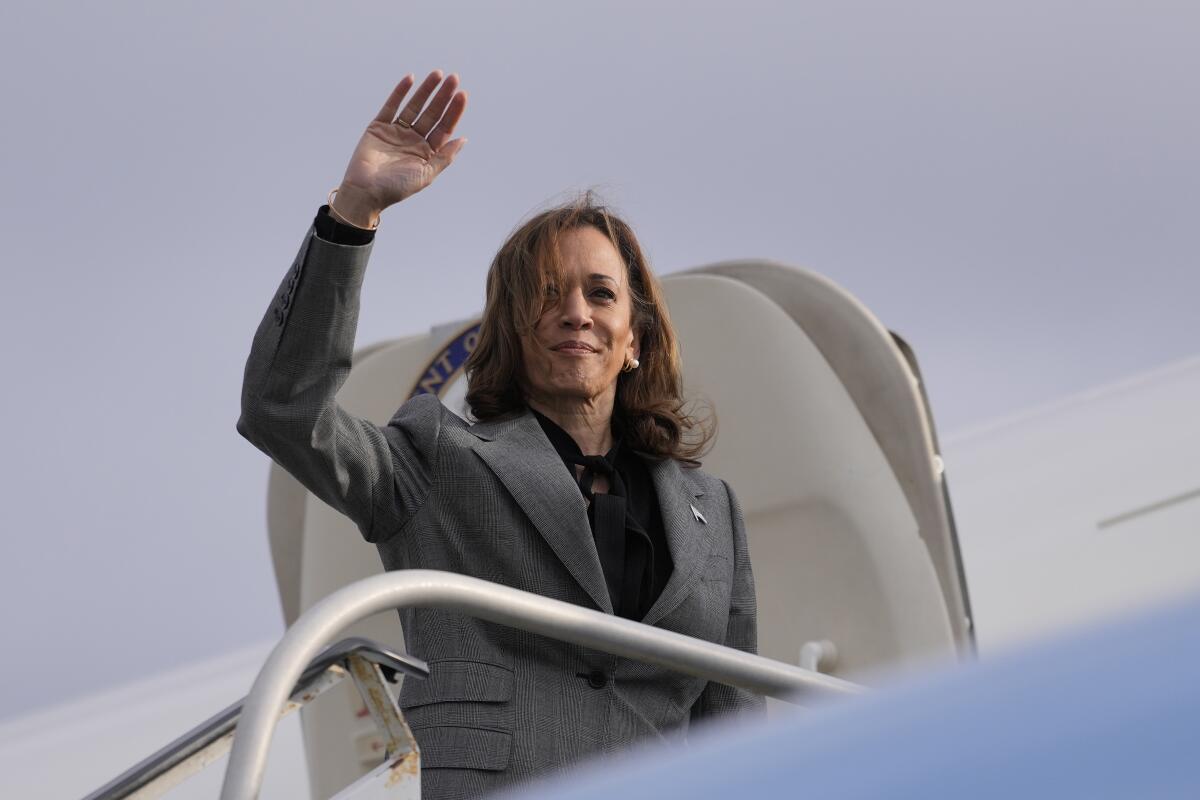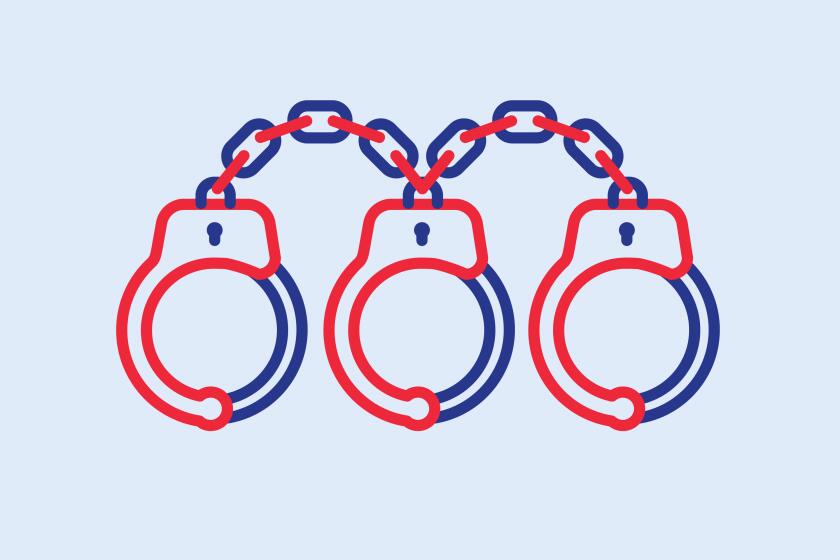How will Kamala Harris vote on California’s Prop. 36 to toughen some criminal penalties? She won’t say

- Share via
Vice President Kamala Harris, a California voter and former attorney general, is declining to say how she will vote on one of the most consequential criminal justice ballot measures to come before state voters in years.
As she runs for president, Harris has emphasized her credentials as the former top law enforcement official for the country’s largest state, presenting herself as “tough” in advertisements and at the Democratic National Convention in August, going after smugglers and seeking justice for crime victims.
But her campaign declined to answer questions from The Times about how she will vote on Proposition 36, a prosecutor-led tough-on-crime ballot measure that splits her Democratic base but has broad support among California voters, according to polls. The measure would impose stiffer sentences and potentially longer jail and prison time for repeat fentanyl and theft offenses, reversing parts of a ballot measure voters approved a decade ago, when Harris was attorney general.
Harris also declined to weigh in on that measure — Proposition 47 — before voters approved it in 2014. And her presidential campaign declined to answer questions from The Times about her views on the older measure, which lowered sentences for certain nonviolent offenses and has reduced prison populations.
Her refusal to answer questions about the two crime measures underscores Harris’ cautious approach, which predates her presidential run. She has given relatively few interviews since Democrats elevated her to the top of the ticket in late July, and the issue has not come up in those encounters. Harris’ strategy depends on winning moderate voters in swing states who may view California issues through a more conservative lens than the state’s political class.
Former President Trump, who is registered to vote in Florida, has struggled to answer how he will vote on a hot-button ballot measure in his state that would expand abortion rights. Trump suggested in a late August interview with NBC that he might support Florida’s abortion rights measure but reversed course a day later after antiabortion activists criticized him. Trump has boasted that as president he appointed Supreme Court justices who overturned Roe v. Wade, fulfilling a 2016 campaign promise, but the issue has become one of his biggest political vulnerabilities.
This measure asks voters to change parts of Proposition 47, a controversial ballot initiative passed in 2014 that turned some nonviolent felonies into misdemeanors.
Republicans have pounded Harris on crime, even as statistics show some property crimes and most violent crimes are down both in California and nationwide. Trump has said cities are “out of control” as he attempts to couple the issue with immigration and describe a broader sense of disorder. Trump in August misleadingly claimed Harris “destroyed California” because of her alleged role in Proposition 47, despite her lack of involvement in passing the measure.
Though Harris did not take a stand on Proposition 47, some of her allies were involved in campaigning for the measure they billed as a progressive criminal justice reform.
“This is a losing issue for Democrats. Full stop,” said Alex Conant, a Republican consultant who advises Florida Sen. Marco Rubio. “She’s still trying to explain and walk back her comments about defunding the police from four years ago. She wants to talk about crime with balanced rhetoric and a complete lack of specifics.”
Harris praised efforts to examine police budgets in the wake of the George Floyd movement but distanced herself from those views when she became President Biden’s running mate later in 2020 and then went on to increase money for law enforcement. She had trouble navigating her record as a career prosecutor during her 2020 presidential primary, facing “Kamala is a cop” critiques from activists on the left that blunted her ability to fully define her more nuanced record.
A cluster of interviews from 2020 provides a unique window into Vice President Kamala Harris’ nuanced worldview on policing and public safety.
Harris entered politics as San Francisco district attorney in 2004 and was elected as the state’s attorney general in 2010 and again in 2014. She has defined her law enforcement approach as “smart on crime,” also the title of her 2009 book. That included creating a program to offer job training and other support for young first-time, nonviolent drug offenders when she was district attorney while seeking to come down harder on sex offenders and others accused of violent crimes.
But when Proposition 47 came before voters in 2014, Harris, then attorney general, declined to weigh in. There were two reasons, according to Nathan Barankin, her chief of staff at the time: The advocates who drafted the proposal did not consult her or ask for her support, which he found surprising. And she had previously decided it was a conflict of interest to advocate for or against most ballot measures because, as attorney general, she was in charge of writing the ballot summary and title.
The poll also gauges how voters feel about initiatives designed to respond to California’s high cost of living.
“AGs always face a damned if you do damned if you don’t quandary,” Barankin said. But “if you weigh in, someone is going to scream bloody murder that you wrote this a certain way to favor your perspective.”
But Harris did weigh in on at least one other measure while she was attorney general. During her 2016 Senate race, when she was still serving as attorney general, she supported a ballot initiative aimed at getting money out of politics, her campaign said at the time.
Harris also used her authority as attorney general to decline to defend a 2008 statewide initiative, which outlawed gay marriage, when it was challenged in court.
Other attorneys general followed a similar practice, mostly remaining neutral on ballot measures but, like Harris, making some exceptions. Former Atty. Gen. Jerry Brown, for example, campaigned against a measure that would suspend the state’s climate policies when he ran for governor in 2010. Atty Gen. Rob Bonta has voiced support for three propositions on abortion rights, gay marriage, and funding for mental health treatment.
“The truth is, Harris took stands when she felt it was a politically smart thing to do and sometimes she didn’t take a position where a voter would want an attorney general to take a position,” said Dan Morain, a former Times reporter who wrote “Kamala’s Way: An American Life,” a biography of Harris.
Newsom was noncommittal when pressed about whether he planned to campaign against Proposition 36, a controversial anti-crime measure on the November ballot.
Morain said Proposition 36 is an especially complicated issue from both a policy and political standpoint. California’s elected Democrats are divided over it, with some arguing the measure will help get more people off the streets and into drug treatment, and others warning it will revert the state to a tough-on-crime era that filled prisons with Black and brown Californians.
“The politics of this are pretty fraught,” he said. “It doesn’t shock me she isn’t taking a stand on this yet.”
Even Gov. Gavin Newsom, who was an outspoken and active opponent of Proposition 36 when the campaign began, appears to have backed down as it becomes clear that it is likely to pass. He said last week that he was unlikely to invest more time and money on the opposition effort.
“I fear I can’t do everything,” he told reporters during a Sept. 19 bill signing ceremony in San Francisco, saying he had a busy political agenda that included electing Harris president.
The comments came on the heels of a poll showing 71% of likely voters support the measure. The Public Policy Institute of California survey found only 26% of voters planned to vote against it. That was a far wider margin than an August poll by the UC Berkeley Institute of Governmental Studies and The Times, showing 56%-23% support for the measure.
More to Read
Get the L.A. Times Politics newsletter
Deeply reported insights into legislation, politics and policy from Sacramento, Washington and beyond. In your inbox three times per week.
You may occasionally receive promotional content from the Los Angeles Times.
















